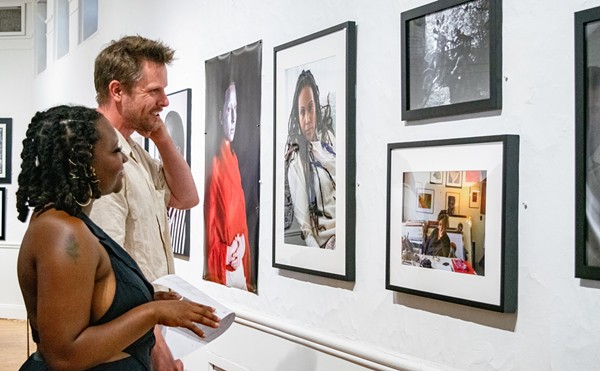In this swooningly beautiful and decidedly quirky film from Australian director Gillian Armstrong (My Brilliant Career, Little Women), a small glass object serves as an apt metaphor for the resilient yet fragile bond between Oscar and Lucinda, an Anglican minister and a restless heiress. A Prince Rupert drop is a tear-shaped piece of tempered glass, created when molten glass is dripped into water. Its round, bulbous end can withstand blows by a hammer, but when its thin tail is snipped, it shatters in a glorious shower of glass fragments.
Oscar and Lucinda, adapted by Laura Jones (An Angel At My Table) from Peter Carey's 1988 Booker Prize-winning novel, not only shows the strengths and weakness of this pair, but portrays them as fated for each other. Even though the film takes its time bringing Oscar (Ralph Fiennes) and Lucinda (Cate Blanchett, the defiant Australian nurse in Paradise Road) together, the film's narrator (also Fiennes), speaking in dulcet tones and lovely language, describes their union as blissfully and tragically inevitable.
In the 1860s, this unlikely duo are nonconformists, Oscar by temperament, Lucinda by choice. Oscar is a socially inept oddball, with a shock of fluorescent red hair and the fluttery mannerisms of a nervous bird. Born into a stern, pleasure-denying Protestant sect, he guiltily leaves his family and community, eventually attending Oxford and becoming a minister with the more mainstream Church of England.
Lucinda, an heiress and owner of a Sydney glassworks, wears her wealth like a yoke. Because she was raised on a remote farm to be independent and self-reliant, her inherited wealth means learning to abide by society's conventions, something this bloomer-wearing proto-feminist can't quite manage.
Both share a deep and boundless passion for gambling, and when they meet, over a game of cards on a steamship going from England to Australia, it really does seem that two lost souls have found their ideal companions. But their creator has other ideas for Oscar and Lucinda, who hatch a plan to build a glass church (which looks like a heavenly greenhouse) and transport it to a remote outpost in the wilds of northern Australia.
Gillian Armstrong is a marvelous director, and Oscar and Lucinda is visually lush and wonderfully acted (although Ralph Fiennes' mannered tics sometimes threaten to undo Oscar). But what may have seemed poetically allegorical in Peter Carey's novel doesn't translate well in this clear-eyed screen adaptation, which lacks the fever dream quality and quixotic romanticism of films such as Werner Herzog's Fitzcarraldo.
Lovely as it is, Oscar and Lucinda is ultimately undone by its overriding sense of predestination. The narrator is a descendant who tells his family's story with the arch tone of its fated rightness, seeming to espouse the philosophy that in life, each person is merely going through the motions of an already planned scenario where free will is of no consequence.
This makes Oscar and Lucinda seem less like compelling, eccentric individuals than mere pawns mercilessly manipulated by an invisible hand.
Serena Donadoni writes about film for the Metro Times. E-mail her at [email protected].





